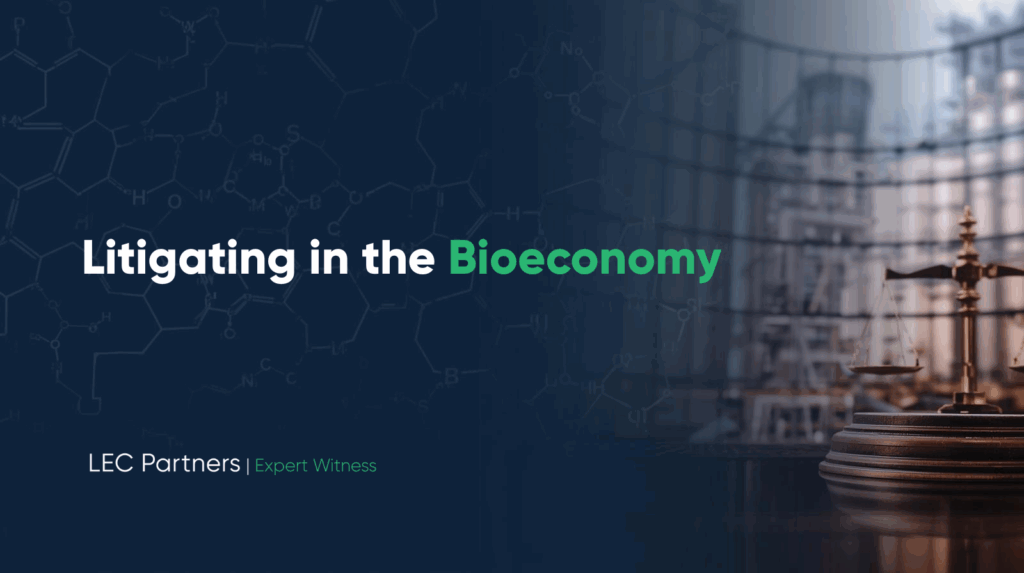Bioeconomy Litigation Expert Witness: Why Courts Need Practitioners, Not Just Scientists

Bioeconomy litigation expert witness demand is rising as the bioeconomy booms—with revolutionary developments in sustainable aviation fuels, microbial fermentation, bioplastics, and beyond. But these breakthroughs are accompanied by legal disputes steeped in technical complexity. From patent infringement to regulatory compliance, bioeconomy cases require far more than textbook knowledge. They require court-tested professionals who’ve engineered solutions, managed projects, and confronted real-world challenges.
At LEC Partners, we’ve built a legacy over three decades by not just analyzing, but actually working in the bioeconomy. Our team includes bioeconomy legal experts who have designed, built, and optimized some of the most complex projects in the world. We are not an expert witness staffing firm; we are practitioners who provide expert testimony in biofuels litigation and renewable energy disputes. This distinction makes all the difference, especially when courts demand clarity in the face of emerging, niche technologies.
Technology Complexity—Going Beyond the Textbook
The bioeconomy spans an array of processes—cellulosic ethanol, anaerobic digestion, Fischer–Tropsch synthesis, synthetic biology—each with unique operational challenges. In litigation, courts require more than theory: they need renewable energy litigation expert witnesses who’ve scaled gasifiers, optimized feedstock streams, and managed fermentation failures firsthand. Independent analysis from the U.S. Department of Energy’s Bioenergy Technologies Office underscores how scaling bio-based processes introduces risks often invisible in academic models.
Practitioner Credentials vs. Pure Academics
“Educational credentials are essential, but practical industry experience is paramount.” Our biotechnology litigation experts don’t just understand processes—they’ve built and operated them, resolving issues at commercial scale. That depth of experience translates to testimony that withstands rigorous cross-examination. The National Academies of Sciences, Engineering, and Medicine similarly emphasizes the importance of practitioner knowledge in producing credible outcomes for courts and policymakers.
Clear, Convincing, Court-Tested Testimony
Legal standards require expert testimony to be based on sound, reliable practices. Our sustainable aviation fuel litigation experts are trained not only to conduct technical analyses but also to communicate them in plain English, with courtroom polish and precision. That level of clarity is critical when judges and juries need digestible narratives, not academic lectures. For judges handling complex cases, resources from the Federal Judicial Center provide guidance on managing technical expert witnesses.
Case Example: Renewable Chemicals & SAF
Recently, one of our technical experts in bioeconomy court cases played a central role in defending a proprietary renewable-chemicals process. Their expertise clarified complex catalytic reactions, equipment specs, and scale-up economics—directly contributing to a favorable resolution. In another matter, our SAF specialists supported legal teams with detailed lifecycle carbon scoring and process engineering analysis—bringing real-world metrics into the courtroom.
Final Word: The Right Expert Changes the Game
Bioeconomy litigation isn’t about who can recite a paper—it’s about who’s stood in a reactor pit, calibrated a syngas stream, or debugged a fermentation failure at 2,000 liters. That’s the depth we bring at LEC. When you engage us, you’re not renting a resume. You’re partnering with professionals who’ve done the work—and can credibly testify to it.
Because in this space, the courtroom demands practitioners—not theorists.
Have some questions?
Not sure where to start?
Let's start a conversation. We're here to help you navigate
the bioeconomy with confidence.
